
… now stronger than ever, surrounded by newly-anointed Gods who will help him shape the NEW ERA OF SOCIALISM CHINESE STYLE. The Communist Party of China’s 19th Congress promotes its leaders to usher an emergent CHINA – strong, wealthy and focused, as it takes its place as a powerful new leader of the world. LILLIAN TOO walk us through the road taken to the top by the ambitious men of China – a steep, hazardous climb that ensures only the very best emerge as the leaders of this great nation. A one-party system that thrives on meritocracy and survival of the fittest! A system that ensures only the most experienced survivors make it.
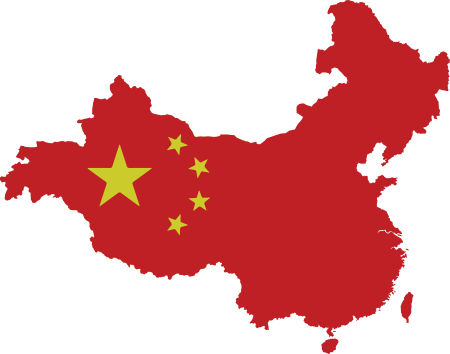 At the 19th Party Congress, General Secretary Xi Jinping speaks for three and a half hours, strongly laying out his vision for China’s growth strategy and policy focus for the coming decades. As leader of a now modern China, Xi Jinping is a 21st Century Emperor of a most powerful country indeed, one whose heritage, wisdom and philosophical insights go back thousands of years.
At the 19th Party Congress, General Secretary Xi Jinping speaks for three and a half hours, strongly laying out his vision for China’s growth strategy and policy focus for the coming decades. As leader of a now modern China, Xi Jinping is a 21st Century Emperor of a most powerful country indeed, one whose heritage, wisdom and philosophical insights go back thousands of years.
Feng Shui, Paht Chee and a great deal more come from China, and today, even as the 19th Annual Congress continues to be in progress, we note that the Congress brings together 2280 delegates, and is attended by 3228 delegates and guests, that the Congress started on Oct 18th (note the good luck connotations of these numbers!) There is no going away from the big aspirations and auspicious luck that always accompanies all that China is, does and aspires to!
China’s political system is the most unique system of government in the world. This great nation of 1.5 billion people is ruled by a single political party known as the Communist Party of China (CPC). With 88.76 million people in its membership roll, the CPC is the largest political party in the world.
In China, not just anyone who is popular, wealthy or well-connected can make it to the top ranks of politics. Aspiring politicians do not run national campaigns to get elected as Premier or President. Someone like Donald Trump would struggle to make it as President of China. The Chinese political system has been carefully crafted to ensure that only those with strong political experience and powerful allies at the top can make it to the very pinnacle of the political ladder.
And what is at the top of this ladder? The Politburo. There is no equivalent in the Western democracies for the Politburo – a group of individuals so powerful they represent the checks and balances of power in China.
The founders of communist China believed that leadership of a nation should not be bestowed on a single person by birthright (i.e. monarchy) or to someone with strong armies or noble connections. Instead, they invented a system of collective leadership, where only a handful of politically experienced, capable and educated individuals, with years of impeccable service record, are allowed to hold the reins of power.
Built into this system are mandatory retirement ages that vary depending on rank. This ensures a shift of personnel and power factions every five years, and creates vacancies for younger members to move up to new levels of authority.
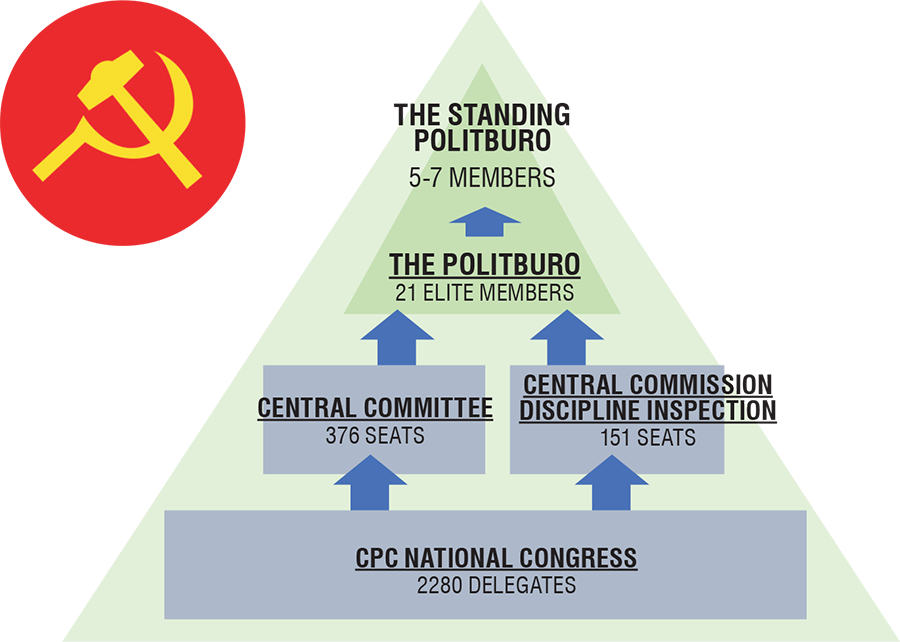
CHINA’S INTRICATE POLITICAL SYSTEM
Truly, China’s political system sets VERY tough standards for those who have BIG ambitions to become leaders of the nation. To appreciate what it takes to make it to the Politburo, we can follow a typical career path of an average young leader aspiring to climb the ladder of power. The actual goal may be hazy, but the starting point is clear.
You begin by involving yourself in local political organisations, being elected or appointed as a high official or mayor of your local township, and you move up to become city mayor, state or provincial governor. By now, you would have gained the experience of running an organisation with several hundreds or even thousands of employees under you.
Of course, if you came from a politically-connected family, you will get noticed sooner, but still, there are no shortcuts. Communist ideology favours egalitarianism, so whatever your background, you are still expected to demonstrate you can bring in results, that you can win support from peers and subjects, that you have the ability to cultivate important superiors as benefactors and can forge allies within the multiple factions of government. And while you are doing this, you have to meet all KPIs to prove that you are effective at your job as mayor, governor or some other official role you hold.
If you have delivered tangible results while maintaining a corruption-free, scandal-free reputation, AND you are also well-liked by the higher-ups of the party, then you might be tapped on the shoulder for promotion.
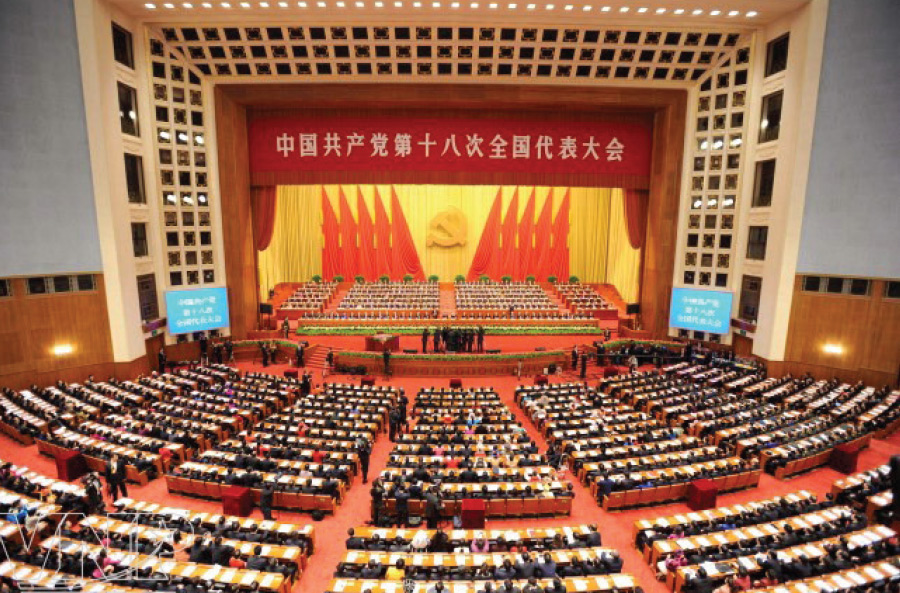
The first milestone of getting a foot in the door of big politics is to be nominated by the party and then elected into the Congress. There are 2280 Congress delegates and it is this CPC National Congress where you get to exercise real power!
By the time you reach this level, you are likely to be in your forties, with the experience of managing public organisations with thousands of people under you. You would have recruited benefactors and allies at state and national levels who have become your mentors.
CONGRESS ELECTIONS are held every 5 years, and Congressmen serve for a maximum of two terms (10 years). There are 2280 Congress positions, and delegates must retire according to age limits or maximum term served. This ensures new blood can be brought into Congress and ineffective members can be removed. Party rules specify that minister-level officials must leave executive positions by age 65, and vice-minister level officials must retire by age 60.
Being part of Congress opens up big career opportunities for you to be given senior roles at government and party-owned commercial enterprises. If you continue to prove yourself loyal and useful to powerful senior party members, someone at the top will nominate you for election to the Central Committee.
The Central Committee is the most powerful political council of the Communist Party after the Politburo. Comprising 205 full members plus 171 alternate members, delegates are elected once every five years at the National Congress. The Central Committee meets once a year to decide on national policy decisions, and every five years to elect new members to the elite Politburo.
Being in the Central Committee not only guarantees you top positions in government, multinational organisations or leading roles in military service, you now have a real shot at getting seriously powerful. If you play your cards right, you may stand a chance of getting promoted into the exclusive Politburo and better yet, be one of the Standing Politburo.
The Politburo has only 25 positions. Only protégés that are groomed by outgoing and retired Politburo members gain entry into this high-powered group. Out of the 25 members, seven individuals are selected be in the Standing Politburo Committee. Selection criteria is supposed to be based on seniority and service record, but in practice, much of it depends on the individual’s ties to the previous Standing Committee members and how much power those ex-members still yield.
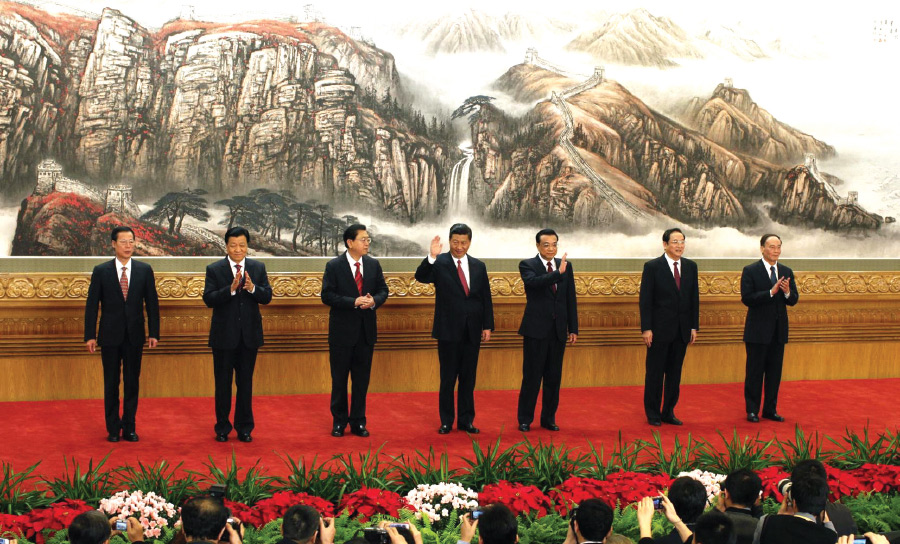
Note that even though the Central Committee formally elects the Politburo, in practice, new Politburo members and its Standing Committee are chosen by current and retired Politburo Standing Committee members. The election is merely a formality.
Members of the Standing Committee are the most powerful men in China – they are often dubbed “the Seven Gods”, as they yield total control over all policy and strategy decisions. Each Standing Politburo Committee member is the head of a large government branch or portfolios (i.e. military, legislative, etc) and they meet once a week. Their decisions set the tone for all decisions made by the Politburo Committee who meet once a month, which then influences decisions by the Central Committee who meet once a year, and their decisions trickle down to Congress, who meet once every five years.
PRINCELINGS VS TUAN PAIS
Politburo members belong to one of two main political factions: the princelings and tuanpais. Princelings are blood descendants/relatives of prominent former revolutionary leaders or ex-Politburo members. Many of them come from powerful upper-class families in the East Coast (Beijing and Shanghai) and are considered the privileged “elitist” faction. They are highly educated in top universities and given head starts early in their careers.
Princelings have a strong advantage over the tuanpais due to their proximity to Beijing and prestigious connections, but in the wake of high profile corruption practices by princelings like Bo Xi Lai, blood ties are viewed in negative light by the general public and by officials who uphold strong communist principles.
Tuanpais refer to individuals who worked their way up from the party’s grassroots or youth leagues. The media calls them the “populists” due to their “common” backgrounds. Many come from less privileged families or originate from provincial regions; their rise to prominence is due to support from other tuanpai higher-ups and solidarity with the common Chinese people. They are also the minority in the upper echelons of power; less than 30% of the Politburo are tuanpai.
The late Deng Xiaoping favoured a balanced power distribution between tuanpai and princeling, and laid tacit rules to ensure that power succession at the top was to alternate between these two groups. When Deng retired, he handed power to Jiang Zemin, a princeling, who was then succeeded by Hu Juntao, a tuanpai. Hu was in turn succeeded by the current President, Xi Jinping, a princeling.
Up to recent times, China’s political system places two different men at the top: the #1 leader is the President, the Head of State and Commander-in-Chief of the People’s Liberation Army, and the #2 leader is the Premier, who is the Head of Government and responsible for the economy. These two positions are the highest ranking positions of office in China and both positions can only be occupied by members of the Standing Politburo Committee.
Xi Jinpeng was the princeling protégé of ex-President Xiang Jemin, while Li Keqiang, the present Premier, is a tuanpai protégé of ex-President Hu Jintao.
THE CORE LEADER of CHINA
Since Deng Xiao Ping’s passing two decades ago, princeling factions have moved aggressively to consolidate power. Most of the Politburo now comprise of princeling loyalists and many of the tuanpai candidates in the Politburo have already pledged allegiance to Xi and his allies.
When Xi came into power five years ago, he moved quickly to place his own allies into key positions at every level. Xi amassed great power by taking over a wide range of leadership roles, including chairing the newly-formed National Security Commission, and creating new steering committees to initiate economic and social reforms, military reform, and policing of the Internet, all of which he sits as the Chairman.
Xi also installed his own man – another princeling – Wang Qishan as head of the CCDI (China’s anti-corruption agency) to gather secrets and keep watch on all party officials. Party members who are non-compliant with Xi’s rules and political agenda are swiftly removed. Over 1.34 million lower ranking officials (and a several high ones too) have already been punished under President Xi Jinping’s anti-corruption drive since he took power in 2013.
Not since the era of Mao Zedong or Deng Xiao Ping has China had one core leader, but President Xi has cleverly tipped the balance of power to his favour in the last five years and emerged as a strong, well-allied and uncontended leader within the Standing Politburo of the CPC.
When Xi came into power five years ago, he moved quickly to place his own allies into key positions at every level. Xi amassed great power by taking over a wide range of leadership roles, including chairing the newly-formed National Security Commission, and creating new steering committees to initiate economic and social reforms, military reform, and policing of the Internet, all of which he sits as the Chairman.
If the Standing Politburo members are the Gods of China, then President Xi is clearly their anointed Jade Emperor.
Many political analysts already see his presidency continuing beyond two terms, as he moves to reduce the influence of the current Premier and replace many of the key military, government and economic councils with his own supporters. The economic portfolio, which used to come under the Premier’s scope of responsibilities, is now controlled by Xi, thanks to his creation of the “Central Leading Group for Comprehensively Deepening Reforms”, of which he is Chairman. This Congress marks the beginning of the “Xi” era.
President Xi is also popular with his subjects for visibly upholding the rule of law, cracking down on corruption and unveiling his attractive new vision called “The Chinese Dream”. His grand plans to revive China’s former empire glory on the world stage through the One Belt One Road initiative and reclamation of the South China Sea has captured the imagination of socialists and capitalists across China, as well as global trade partners around the world. The revitalisation of ancient Silk Roads and Silk Routes are already underway; most of its infrastructure are funded and owned exclusively by Chinese corporations.
Don’t forget that China’s army (the People’s Liberation Army) – is the largest military force in the world – of which President Xi is Commander-in-Chief. With all the latest developments since Xi took over, it’s not surprising that The Economist named President Xi as “The World’s Most Powerful Man” this year!
The 19TH CONGRESS – ANNOINTING THE NEW GODS OF CHINA
Currently there are seven Standing Politburo members. Five of them are already over 68 years and due for retirement; hence everyone is watching closely to see who will succeed them. By the time you read this, results would have been announced, but here are the Chinese whispers floating around…
Firstly, there is growing belief that President Xi plans to hold on to power beyond his second term. To reduce contenders for the next Congress, he may depart from convention and cut down the number of standing committee members to six or five, and fill vacant spots with younger loyalists who can serve two terms without being expected to retire.
Also rumoured is that Xi may ignore age protocols to keep his CCDI watchdog Wang Qishan in the Standing Committee until most of his adversaries are purged. Some speculate that Wang will replace Li Keqiang as Premier and Xi will install another princeling for the CCDI job; but all these are just rumours. The Chinese are famous for leaking fake news and springing surprises on the world! But readers can tune into the Chinese network of ASTRO and hear the news and the analysis for themselves!

Here then is the WATCHLIST…
 Li Zhanshu (Tiger, age 67) – A highly influential member of Xi Jinping’s inner circle and considered a “dark horse” candidate for the Standing Committee. Li has the seniority and experience. He was promoted into the Politburo at the same time Xi became President. Xi installed him Chief of the National Security Commission and Director of the General Office of the CPC. Previously, he served as Governor of Heilongjiang Province, Party Secretary of the Guizhou Province, Party Secretary of Xi’an and numerous other party leadership positions. Due to his many roles across several provinces, Li brings with him powerful allies from provincial areas.
Li Zhanshu (Tiger, age 67) – A highly influential member of Xi Jinping’s inner circle and considered a “dark horse” candidate for the Standing Committee. Li has the seniority and experience. He was promoted into the Politburo at the same time Xi became President. Xi installed him Chief of the National Security Commission and Director of the General Office of the CPC. Previously, he served as Governor of Heilongjiang Province, Party Secretary of the Guizhou Province, Party Secretary of Xi’an and numerous other party leadership positions. Due to his many roles across several provinces, Li brings with him powerful allies from provincial areas.
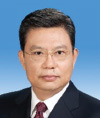 Zhao Leji (Rooster, age 60) – Head of the Organization Department, his job is to pre-screen candidates and compile short lists for key government positions! Many high-ranking officials in power owe their good fortune to Zhao and he has an unblemished resume for the Standing Committee. According to the South China Morning Post, two inside sources have confirmed that Zhao will replace Wang Qishan as the next head of the CCDI.
Zhao Leji (Rooster, age 60) – Head of the Organization Department, his job is to pre-screen candidates and compile short lists for key government positions! Many high-ranking officials in power owe their good fortune to Zhao and he has an unblemished resume for the Standing Committee. According to the South China Morning Post, two inside sources have confirmed that Zhao will replace Wang Qishan as the next head of the CCDI.
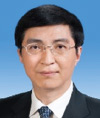 Wang Huning (Sheep, age 62) – Currently Head of China’s Central Policy Research Office and regarded as Xi’s closest policy and political science advisor. He is the brains behind ideological taglines for ex-Presidents Jiang Xemin (“Three Represents”) and Hu Jintao (“Scientific Outlook”). Currently, he is the main architect behind all major policy initiatives and is credited for hatching the “Chinese Dream” campaign for President Xi. Wang is a specialist in U.S. politics and speaks fluent English and French. He is frequently consulted in matters of foreign relations. Wang has authored several books on politics, including Logic of Politics – the Principal of Marxism Politics, America against America, General Introduction to New Politics, Analysis of Modern Western Politics, Analysis of Comparative Politics, and Debate Contest in Lion City.
Wang Huning (Sheep, age 62) – Currently Head of China’s Central Policy Research Office and regarded as Xi’s closest policy and political science advisor. He is the brains behind ideological taglines for ex-Presidents Jiang Xemin (“Three Represents”) and Hu Jintao (“Scientific Outlook”). Currently, he is the main architect behind all major policy initiatives and is credited for hatching the “Chinese Dream” campaign for President Xi. Wang is a specialist in U.S. politics and speaks fluent English and French. He is frequently consulted in matters of foreign relations. Wang has authored several books on politics, including Logic of Politics – the Principal of Marxism Politics, America against America, General Introduction to New Politics, Analysis of Modern Western Politics, Analysis of Comparative Politics, and Debate Contest in Lion City.
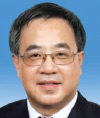 Hu Chunhua (Rabbit, age 54) – Currently party chief of the Guangdong province, once considered to be the “heir apparent” of Xi Jinping. He was promoted into the Politburo in the previous Congress but sources say he has fallen from favour. His track record in Guangdong has been tainted by on-going anti-corruption campaigns and Guangdong’s economic growth has slowed from double-digits to 8%. But he is young, capable and known to be loyal… chances of him entering the Standing Committee are still viable.
Hu Chunhua (Rabbit, age 54) – Currently party chief of the Guangdong province, once considered to be the “heir apparent” of Xi Jinping. He was promoted into the Politburo in the previous Congress but sources say he has fallen from favour. His track record in Guangdong has been tainted by on-going anti-corruption campaigns and Guangdong’s economic growth has slowed from double-digits to 8%. But he is young, capable and known to be loyal… chances of him entering the Standing Committee are still viable.
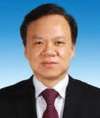 Chen Min’er (Rat, age 57) – Analysts believe he is Xi’s new secret protégé! He has been sent to replace the disgraced Sun Zhengcai as the new Chongqing party chief and some believe he will get bumped directly into the Standing Committee from ordinary Central Committee member. There is already precedence for this: both Xi Jinping and Li Keqiang skipped the Politburo-level at the 17th Party Congress in 2007 and were promoted directly into the Standing Committee.
Chen Min’er (Rat, age 57) – Analysts believe he is Xi’s new secret protégé! He has been sent to replace the disgraced Sun Zhengcai as the new Chongqing party chief and some believe he will get bumped directly into the Standing Committee from ordinary Central Committee member. There is already precedence for this: both Xi Jinping and Li Keqiang skipped the Politburo-level at the 17th Party Congress in 2007 and were promoted directly into the Standing Committee.
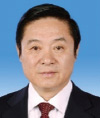 Liu Qibao (Snake, age 64) – He was former party chief of Sichuan province and was promoted into the Politburo five years ago, and appointed Head of the Propaganda Division after his predecessor Liu Yunshan was brought into the Standing Committee. If history repeats itself, he will follow the footsteps of Liu and be promoted to the Standing Committee as well.
Liu Qibao (Snake, age 64) – He was former party chief of Sichuan province and was promoted into the Politburo five years ago, and appointed Head of the Propaganda Division after his predecessor Liu Yunshan was brought into the Standing Committee. If history repeats itself, he will follow the footsteps of Liu and be promoted to the Standing Committee as well.























